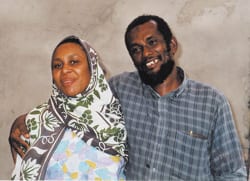Birth of a new cooperative
by Anita Schulz and Penelope Stone
This article was originally published in October 2001
Sustaining organics globally, introduction by Trudy Bialic, Editor
Sometimes travelers see indigenous people as sources from which they can earn money, without regard to the needs of the local people or their traditions. There are no exact numbers on revenues lost to the exploitation of indigenous cultures, but there’s plenty of evidence that traditional medicinal remedies, commercial medicines based on indigenous peoples’ knowledge, are being sold over the Internet and elsewhere.
There also are reports that indigenous people have stopped sharing information about plants, for fear of being cheated again. Indigenous people from the Amazon jungle went to the World Peace Summit in New York recently to plead for an end to exploitation of their habitat and culture by multinational corporations.
Against this trend, it’s a pleasure to tell the story of a new vendor during co-op month.

The Madawa cooperative
One day in December 1997, we went to Zanzibar on holiday and met “Madawa,” a fifth generation herbalist on the island. One year later, we returned to apprentice with Madawa to learn more about native botanicals.
Madawa himself apprenticed with his father. As the oldest son, he learned the traditional way, witnessing practical applications of herbal formulas, each generation fine-tuning the formulas. Madawa’s oldest son, Saide, has been under Madawa’s tutelage “since he was old enough to walk” and someday will serve the role of his father. Today, Madawa will ask Saide to mix a particular formula — he then will touch, smell, taste and identify each ingredient and quantity. His formulas may be ground herbal blends, teas, soaps or balms.
Zanzibar is one of the Spice Islands in the Indian Ocean off the Tanzanian coast. Its tropical climate is perfect for herbs and spices such as neem, turmeric, lemongrass and eucalyptus.
Living with Madawa’s family madeus re-evaluate life priorities. It cut through the urban chaos, making us realize that health is a lifestyle, that “organic’ is a way of living. The strength of family, community, and the knowledge of plants and medicinals is tremendous.
Our experience, observing the local hard working farmers and being graciously accepted by his community, made us realize an opportunity to preserve this organic lifestyle. By opening a U.S. market to the local farmers, we could help sustain organic farming traditions that have been around for generations, while the farmers could make a living doing what they know and love. The children in the community can go to school, housing and quality of life is improved.
After four years working with the U.S. Food and Drug Administration, the Department of Agriculture, and Zanzibar’s Ministry of Agriculture and Health, we’ve initiated a cooperative.
We’re pleased that PCC is completing this circle of sustainability by offering Madawa’s pure and natural Back to Health Basics™.
